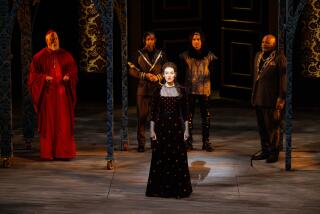Review: A spectacular new ‘Uncle Vanya’ at San Diego’s Old Globe
Reporting from San Diego — Sometimes you don’t know how much you need Anton Chekhov until you re-encounter him.
“Uncle Vanya,” one of the Russian writer’s four dramatic masterpieces, is on view here at the Old Globe’s Sheryl and Harvey White Theatre in a spectacular production that brings together the Russian translation powerhouse team of Richard Pevear and Larissa Volokhonsky and the distinguished playwright Richard Nelson, who not only collaborated on this new English version but also directed.
Nelson’s recent work has taken a Chekhovian turn with a series of dramas (“The Gabriels” and “The Apple Family” plays) in which characters, sitting at the dinner table, contemplate their lives from every conceivable public and private angle. The subtitle of the “Apple Family” cycle is “Scenes From Life in the Country,” which is the designation Chekhov gives to “Uncle Vanya,” not wanting to cramp his work into the more conventional categories of comedy or tragedy.
This new “Vanya” has a conversational smoothness that removes the cobwebs sticking to those other translations that never let you forget that the play was written in 1897. The words tumble naturally from the mouths of the actors, who deliver their lines as though they are having casual exchanges without anyone else in the room.
It’s the influence of film acting that makes the production seem so invigoratingly contemporary.
A rigorous aesthetic is in play. Nelson, working with the sound designer Will Pickens, has developed a production style that deploys hanging microphones and special audio technology that release actors from the obligation of projecting their voices. Listening devices are available to audience members for those moments when an actor is speaking in low tones with his or her back to you (something that happens as a matter of course at this kind of in-the-round theater).
Most of the time I didn’t wear the headphones. But when I did, the effect was remarkably clear. There was no fuzzy amplification leading to confusion over who was speaking. The pleasure was one of guiltless eavesdropping.
This Old Globe production, a reason to brave the long drive to San Diego, modernizes Chekhov’s play without updating it. The period, treated with consistency of theatrical tone rather than precise historical markers, is more or less Russia at the turn of the 20th century. (The design, which includes Jason Ardizzone-West’s sets, Susan Hilferty and Mark Koss’ costumes and Jennifer Tipton’s lighting, finds an ideal palette that is at once discreet and sharply defined.)
The play, trimmed and hastened along, unfolds onstage in a brisk two hours (not including intermission), and every minute is imbued with a density of life. But it’s the influence of film acting that makes the production seem so invigoratingly contemporary.
Chekhov, one of the founding fathers of modern realism, fomented a revolution in the theater against melodrama, with its phony climaxes, stereotypical psychology and neat division between good and evil. His plays present the way lives are irrevocably changed as characters busily go about their days, eating, flirting and arguing while pining away for all that has vanished or, worse, never materialized.
Chekhov’s natural manner, however, isn’t the same thing as naturalism. There’s a compositional fluidity to the playwriting. Verisimilitude is enlivened with spry theatricality. The artist’s invisible hand is always at work, bringing the various elements of the stage picture into conversation, varying the tone so that scenes don’t become airless or too heavy and relaxing the strictures so that characters can give voice to their inner thoughts, however scattered or self-deluding.
The stylistic variety has often overwhelmed American theater companies, who are so determined to make the characters real that they lose sight of the artistic delicacy guiding the human drama. Nelson’s solution isn’t comprehensive or definitive. Dimensions of Chekhov’s dramaturgy are abridged or missing.
Purists would have reason to object, but lovers of Chekhov have cause for celebration: This is one of the most exquisite renderings of “Uncle Vanya” I’ve encountered, a heartbreaking reading of the play that retains just enough of the original’s sly humor to be truly Chekhovian.
It has taken a playwright to show us how Chekhov can be staged today. Nelson’s strengths as a director lead him to the heart of what makes “Vanya” such an enduring work of dramatic literature. The character relationships are laid bare with the speed and dexterity needed to bring forth Chekhov’s compassionate vision of the human condition.
The pitch-perfect ensemble is led by Jay O. Sanders as Vanya, the lovable loser who, in running his family’s estate, has run himself spiritually and physically into the ground. The country household, normally racked by boredom, has been thrown into chaos since the arrival of professor Alexánder Serebryakóv (marvelous, faultless Jon DeVries), who was the husband of Vanya’s now dead sister. Alexánder is accompanied by his much-too-young-for-him second wife, Eléna (an enchanting Celeste Arias), who is as lazy as she is lovely.
Middle-aged and miserable, Vanya is enraged that he has slaved his life away for his brother-in-law, a self-preening scholar who thinks only of his own aches and pains. To make matters more excruciating, Vanya has fallen under the spell of the professor’s wife, but his passion for Eléna goes unrequited, as is the usual romantic fate in Chekhov.
Sanders, one of several cast members who have been working regularly with Nelson in recent years, is an unsung national treasure. Vanya is the role that brings his lumbering build, clarifying intelligence and emotional muscle into magnificent synthesis. Anger, lust, tenderness and self-pity commingle so naturally in his portrayal that I expect that Vanya will from this point forward retain for me Sanders’ distinctive deportment and physiognomy.
Yvonne Woods captures the self-abnegating goodness of Sónya, Vanya’s plain niece who loves Ástrov (a devilishly seductive Jesse Pennington), the visiting local doctor and ardent environmentalist who has eyes only for Eléna and his glass of vodka. Heartsick as Sónya becomes, she cannot treat her father’s flirtatious wife as a rival. The scenes between Woods and Arias beautifully exemplify the dramatic possibilities of characters unable to be pigeonholed as villains or victims.
Nelson closes in so tightly on the major characters that the secondary ones get a bit lost in the shuffle. Kate Kearney-Patch’s Marína, the old nurse who knows how to soothe the querulous personalities around, doesn’t want the spotlight, but her presence deserves to be felt more strongly. Even the formidable Roberta Maxwell, in the role of Márya, Vanya’s bluestocking mother who’s exasperatingly devoted to the professor, fades into the background.
Few will raise a fuss that the impoverished landowner given the nickname Waffles has been cut here, but I missed his guitar in the play’s shattering finale. Theatrical tableau isn’t at all a priority for Nelson, though he handles with comic aplomb the scene in which Vanya tries to take revenge on the professor for supposedly ruining his life.
In a bold directorial stroke honoring the tremendous freedom of Chekhov’s art, the actors confide their interior monologues directly to members of the audience. The coziness of the theater is complemented by the intimacy of the playing.
“Uncle Vanya,” a play about learning to endure with aesthetic dignity the disappointments and grief that are inseparable from living, is hardly the most upbeat of dramas. But I left the Old Globe grateful for a production that allowed for such a rich confrontation with indelible truths.
♦ ♦ ♦ ♦ ♦ ♦ ♦ ♦ ♦ ♦
‘Uncle Vanya’
Where: Old Globe’s Sheryl and Harvey White Theatre, 1363 Old Globe Way, Balboa Park, San Diego
When: 7 p.m. Tuesdays-Wednesdays, 8 p.m. Thursdays-Fridays, 2 and 8 p.m. Saturdays, 2 and 7 p.m. Sundays; ends March 11
Tickets: Starts at $30
Information: (619) 234-5623 or www.TheOldGlobe.org
Running time: 2 hours, 15 minutes
Follow me @charlesmcnulty
More to Read
The biggest entertainment stories
Get our big stories about Hollywood, film, television, music, arts, culture and more right in your inbox as soon as they publish.
You may occasionally receive promotional content from the Los Angeles Times.











